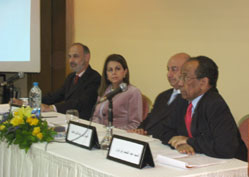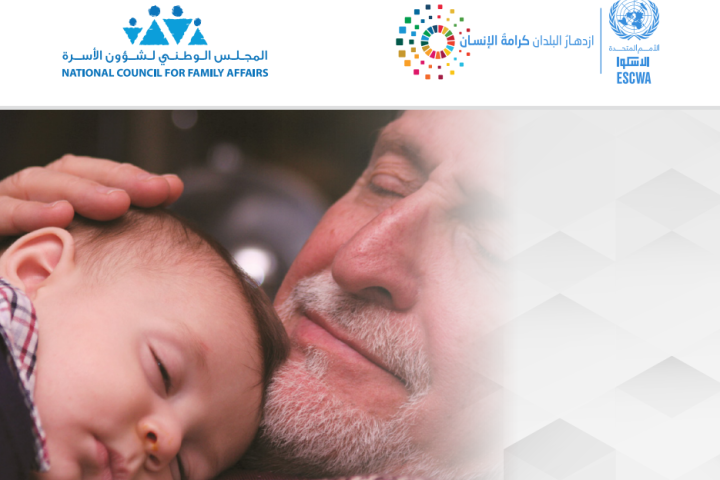UN-ESCWA organized an Expert Group Meeting (EGM), with the support of the United Nations Population Fund (UNFPA) and in collaboration with the Higher Population Council in Jordan, to discuss a regional framework for integrating demographic transition in development plans and programmes in the Arab countries. The meeting was held in Amman on 3 and 4 April 2007 under the patronage of Jordanian Minister of Planning and International Cooperation Suhair El Ali.
The EGM was conducted as part of UN-ESCWA's continuous efforts in the area of integrating population issues with development, particularly integrating the changing age structure of population in the process of social and economic development. It aimed at adopting a pilot framework which comprises the major steps required for integrating demographic transition in the development process. The framework should ensure a systematic entry point that assists researchers in determining the timing of the demographic window and in analyzing the conditions and requirements needed to maximize the economic and social return of this opportunity. In addition, the framework is intended to be a reference tool that guides policy-makers in formulating responsive integrated economic and social policies.
The EGM comprised PowerPoint presentations that summarized the main issues pertaining to the relationship between demographic transition and development. The presentations underscored the pioneering role of UN-ESCWA in adopting an agenda for monitoring the demographic changes involved in the different development stages in the Arab region. UN-ESCWA presentations also emphasized the need to move beyond linking human numbers with the limited available resources, to a wider approach where formulating, implementing, and monitoring policies and programmes related to sustainable development, social equity and reduction of poverty are driven by consideration of both the quantitative and qualitative aspects of population.
The participants, who are eminent regional experts in the fields of population, economy, sociology, and demography, were invited to share their experiences, as well as their scientific and practical consultations regarding the meeting's main working document entitled "Demographic Transition and Methods of Integration in Development Plans and Programmes in the Arab Region." In preparing this document, UN-ESCWA conducted an in-depth review and analysis of available theoretical and application models that are used in planning and preparing integrated development programmes. Participants were then clustered into four working groups by area of expertise to discuss the major components of the study and provide their recommendations as regards the theoretical aspects, the models, the practicality or applicability of the proposed framework and its ability to formulate integrated social, economic and population policies in the Arab region.
The first working group emphasized the importance of elaborating the theoretical aspects, especially those related to the experience of East Asian countries who succeeded in utilizing the demographic transition to strengthen the gross domestic product and use the returns of this transition for developing human resources and creating human capital. The second group recommended the review of additional models with the capacity to accommodate a greater number of variables and permit different economic projections in light of the expected demographic changes. In conformity with new models proposed by international scientific centres, the group emphasized that due consideration should be given to the current generation of Production Functions, in which physical and human variables such as population growth, size of labour force, level of education and training requirements can be accommodated and analysed in accordance with various scenarios on productions, technology and employment. The third working group underscored the need to test the proposed model on the national level and explore the option of linking the general framework of the model with the Millennium Development Goals (MDGs), given the quantitative and qualitative dimensions of the demographic transition associated with the realization of these goals. The fourth working group praised the recommendations of the working document. It presented constructive suggestions for the requirements and conditions needed for UN-ESCWA to translate these recommendations into an action plan that accelerates the integration process, provides training and enhances national capacity in the area of demographic analysis.
The Commission was represented by Mr. Francois Farah, Chief of the Social Development Division, who gave a presentation entitled "Integrating Population Dynamics in Development Planning and Social Policy Approach", and Ms. Batool Shakoori, Team Leader of Population and Social Policies, who gave a presentation on "UN-ESCWA Experience in Integrating Population Issues and Changes Within the Development Planning Process".
At the concluding session, participants called on UN-ESCWA to maintain its pioneering role in perceiving and analysing the implications of demographic transition and providing supporting conditions in the Arab world to disseminate concepts, train on the methods of measurement, and build national capacities. This will ensure that the opportunity offered by the demographic transition to achieve economic, social and political returns that serve the goals arising from international conferences, particularly the MDGS, would not be a foregone opportunity.




